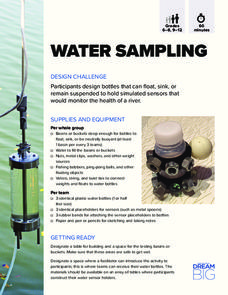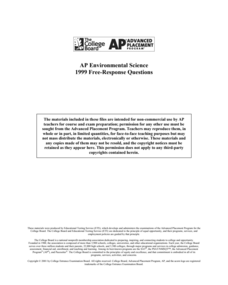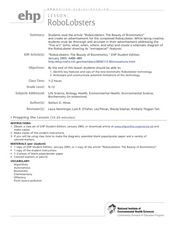Curated OER
Water Holes to Mini-Ponds
Students compare two mini-ponds. In this environmental awareness lesson, students build two mini-ponds from water holes. Students add fertilizers to one and not to the other. The results are observed and compared. This could easily be...
University of Florida
Protecting Our Water Resources
Teach young environmentalists to protect their planet's resources with a set of interactive experiments. Kindergartners and other youngsters learn about watersheds and the water cycle, while older elementary learners focus on fertilizer...
May Media Group
Treatment Plants
Young scientists explore nature's water treatment plants in this simple science demonstration. By placing a stalk of celery in a cup of water mixed with food coloring, children are able to observe how plants absorb nutrients and...
Earth Day Network
Filtering Water
See the water filtration system up close with a fun science experiment. Young scientists work for several class periods to design a water filter using household objects, and then decide which filter material would be most effective...
California Academy of Science
Sustainable Water Solutions: Weighing the Pros and Cons
Switching indoor water fixtures to low flow reduces water usage by more than 45 percent. This and other solutions to reduce water usage have both pros and cons. Scholars view videos of different solutions, discuss them in small groups,...
DiscoverE
Water Sampling
What is the best way to test water quality? Using plastic bottles, scholars create monitoring sensors to test water quality. Creating three different sensors allows individuals to measure water quality at different water levels.
National Institute of Open Schooling
Water Pollution
Fifteen million children under the age of five die each year due to diseases in their drinking water. Water pollution is the topic of lesson 34 in the series of 36. Scholars, through reading and discussing, study numerous aspects of...
College Board
2009 AP® Environmental Science Free-Response Questions
How do genetically modified crops affect agricultural practices? This is one of four environmental questions scholars respond to in an AP® test prep resource. Other topics include methane digesters, water runoff, and nitrogen-based...
College Board
2002 AP® Environmental Science Free-Response Questions
Are electric motors all they're cracked up to be? Scholars take a stance and use their knowledge to discuss the benefits and disadvantages of the motor as the first question in a series of four. The questions that follow ask about other...
College Board
1999 AP® Environmental Science Free-Response Questions
Pollution is a real concern in most areas of Earth. A four-question AP® assessment has learners analyze data related to water pollution and air pollution as well as consider the pros and cons of recycling. Each question has several...
Foundation for Water & Energy Education
How Can Work Be Done with Water Power? Activity A
Environmentally friendly engineering teams construct a water wheel and experiment with its speed and the resulting amount of weight it can lift. Consider following this activity with two more of the same title by the same publisher when...
Teach Engineering
Introduction to Environmental Engineering
A series on environmental engineering introduces the class to issues that environmental engineers work to solve. This first lesson focuses on air and land issues, and looks at ways to reduce pollution.
Teach Engineering
Water Remediation Lab
Water filtration — that's pure genius! Groups test the ability of a water filter to purify water by running chlorine contaminated water through a filter and measuring the chlorine concentrations as they filter the water. They then graph...
Curated OER
Robo-Lobster
Introduce environmental science or engineering explorers to different forms of sampling. They read an article about "Robo-lobsters," lobsters being studied to help design robots that can used to sniff out pollution in ocean waters. The...
Curated OER
Ecosystem Services - Water Purification
Students see that ecosystems provide services to people that are essential to life as we know it. Reporters (drops of water) could interview the trees and soil in the surrounding ecosystems for news stories on how they helped keep the...
Curated OER
Who Owns Water
Students role play how water is allocated to different holders of water rights. In this ecology lesson plan, students identify the different water rights available. They explore problems associated with water use including drought,...
San Francisco Public Utilities Commission
What is Drought? No Rain, No Water
How can climate change affect our water supply? Have kids read a passage about the water cycle and water conservation, which includes six questions that challenge them to use context clues.
Pulitzer Center
The Global Water Crisis
High schoolers examine the "quiet crisis," the lack of clean water, by reading articles and viewing video clips. They discuss the situations in Ethiopia, Yemen, Kenya, and Nepal. There are two options for the lesson, but one of them...
Pennsylvania State University
Learn, Protect, and Promote Water
A hands-on activity helps learners explore the water cycle. After discussing how they use water, classes discuss water pollution and then move into a simulation where 20 pupils move through the water cycle based on description cards.
Curated OER
Science Jeopardy
Wow! Review an entire semester of biology curriculum playing this Science Jeopardy game! The variety of topics is extremely broad, so you will need to review each question to find if they all apply to your course. As you find material...
College Board
2004 AP® Environmental Science Free-Response Questions
Radioactive isotopes have a wealth of uses, but their waste may cause some concern. One of four free-response questions challenges learners to devise a waste removal strategy for medical radioactive substances. Other questions address...
Teach Engineering
Introduction to Water Chemistry
What are the issues surrounding water quality? Viewers of this short presentation gain information about the importance of clean water, the lack of fresh water, water contamination, and ways that engineers treat water.
Curated OER
The Day After Tomorrow: How is the Density of Water Related to Climate Change and Global Warming?
Science learners simulate what happens when ice breaks up and floats on water and how increased pressure on ice causes it to melt faster. They view a clip from the movie, The Day After Tomorrow, and relate their lab activities to what...
Curated OER
Keeping our Water Clean
Second graders discuss how our actions impact the quality of water. In this environmental science lesson, 2nd graders watch a short film and discuss the problem of polluted water. Students are then divided into groups and record their...

























